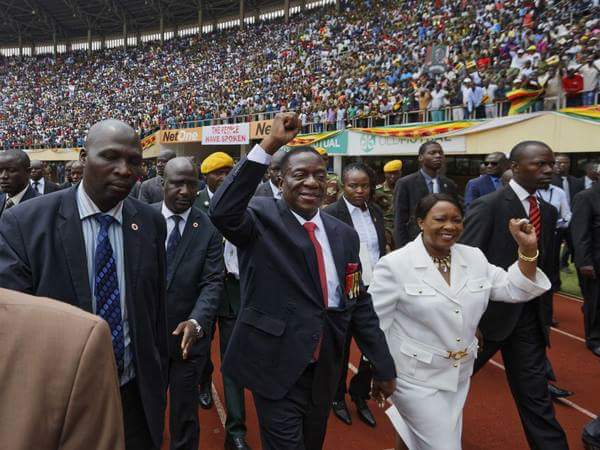By Farai Chirimumimba
Zimbabweans witnessed the inauguration of their third president, Emmerson Mnagagwa. The interim president who is to rule for about eight months before general elections in July or August 2018 vows to rebuild Zimbabwe in a bleak inaugural address after taking his oath of office on 24 November. Cde Mnangagwa summed up the past few decades of social and economic change witnessed in Zimbabwe. He was a cabinet minister and later Vice-President during the former President Robert Gabriel Mugabe’s 37-year reign.
Mugabe resigned on Tuesday 21 November, in a historic moment that brought his 37 years of oppressive rue to an end. The former leader has been accused of waging a campaign of fear to remain in power for nearly four decades and human rights activists have long called for him to be brought to justice. He was also accused of ordering a string of massacres in early mid 1980s in Matabeleland region that killed up to 20,000 people. He has also been accused of corruption to finance his lavish lifestyle, as his government grove the once prosperous nation into economic ruin and poverty.
In Mnangagwa’s remarks on Wednesday, he made it clear that he played a role in the military coup to remove Mugabe from power. He said he had been in “constant contact” with military chiefs throughout the operation. The military was instrumental in Mugabe’s demise, staging the apparent coup, which they denied was a coup then leading talks with Mugabe to allow him a dignified resignation. Mnangagwa’s return has raised a sense of nervousness in Zimbabwe. He is alleged to have been behind some of Mugabe’s most ruthless policies and to many he represents the oppressive status quo. Known as “The Crocodile” for his political cunning and longevity, Mnangagwa has been accused of orchestrating massacres in the 1980s when he was state security minister, an allegation he denies.
The citizens did not know what to expect from the inauguration address of a new president because it was foreign to them. The president was addressing forgotten men and women who want to be part of the unprecedented historical movement that had taken power from the alleged corrupt and selfish elites that control government in Harare, an establishment that had enriched and protected itself while leaving the real Zimbabweans wrecked by poverty, crime and insecurity.
The message of Mnangagwa’s speech on 24 November was somber. The new president promised. This Zimbabwean carnage, which has led to grinding poverty, will be dealt with by the government. He preached unity and forgiveness when he said, “I humbly appeal to all of us to let bygones be bygones,” in apparent reference to the Generation 40 (G40). Zimbabwe is in crisis he said. The nation requires urgent attention. The economy is badly weakened. Health care is too costly, Zimbabwean schools fail too many. Turning to the woeful state of the economy he said, corruption must stop and that the “country’s economic policies will be hinged on agriculture in a way that would be expected to enhance job creation.”
He also says “key principles will be pursued in order to attract foreign direct investment as Zimbabwe seeks to move steps up. The economic policies to be pursued will incorporate elements of market economy. The bottom line is an economy which is firm on its feet in order to achieve job creation and development. The liquidity challenges prevailing in the country will be tackled head-on,” he said a consequence of poor performance of the economy and of greed and irresponsibility on the part of some unscrupulous elements. Mnangagwa said, “We must work together. Ours is a great country endowed with great resources.”
Mnangagwa paid tribute to the founding father of Zimbabwe, President Robert Mugabe. “Whatever errors may have occurred…let’s all accept his immense contribution to the nation.” He also promises to pay farmers who lost their land during the accelerated land reform in the early 2000s. In an unexpected tone he said that Zimbabwe was willing to reengage the western countries. President Mnangagwa commits that the upcoming 2018 elections will be held as scheduled and democratically around July or August.
Cde Mnangagwa’s speech prompted roars of approval from passionate supporters that filled the 60,000 National Sports Stadium to capacity, who broke in chants of “ngwena”, “ngwena”, “ngwena” (translated to mean the crocodile) in reference to Mnangagwa’s nickname which unconfirmed reports say he earned because of being ruthless to his enemies. Like Mugabe, he promised to be a leader for all Zimbabweans, and not just those who voted for ZANU-PF in 2013 elections. What remains to be seen is whether his rule will not be another Zimbabwean carnage.
